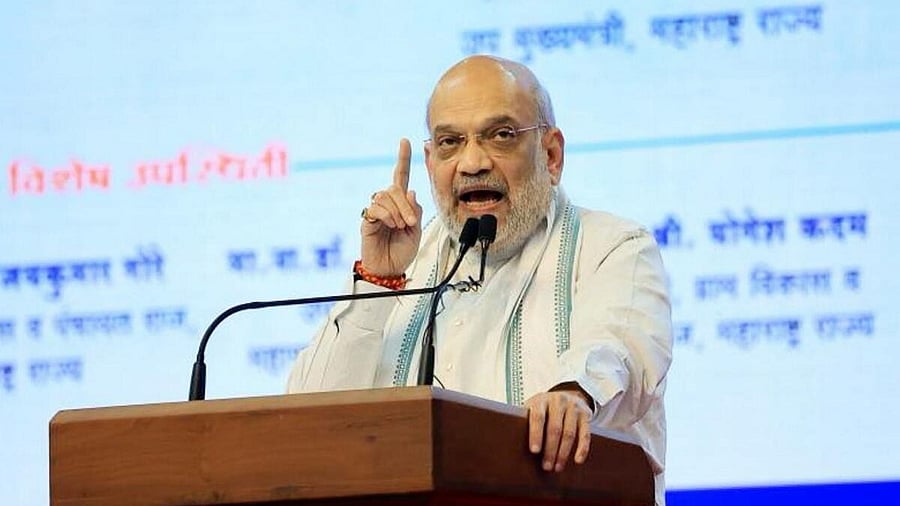
Union Home Minister Amit Shah
Credit: PTI Photo
Chennai: Union Home Minister Amit Shah on Wednesday asserted that the southern states won't lose even a single Lok Sabha seat when the Delimitation exercise is taken up, but on the contrary, their political representation will only go up since there will be no reduction on a pro rata basis.
Shah, addressing a public meeting in Coimbatore after inaugurating BJP offices in three districts, gave an assurance to Tamil Nadu, Karnataka, Andhra Pradesh, Kerala, and Telangana that Prime Minister Narendra Modi will ensure that injustice is not rendered to them in terms of allocation of Parliament seats.
The public assertion by Shah comes a day after Tamil Nadu Chief Minister M K Stalin raked up the issue by convening an all-party meeting on March 5 to draft a “joint response” in asking the BJP-led Union Government to adopt a “fair and transparent approach”. He had predicted that TN would lose eight Lok Sabha seats if the Delimitation exercise was conducted based solely on population and with the total number of seats capped at the current 543.
"Chief Minister M K Stalin has now taken up a new issue. He is lying to the people of Tamil Nadu that the number of Parliament seats for the southern states in Parliament will reduce post-delimitation. The Modi government has told Parliament that no state will lose seats. Tamil Nadu and other southern states will not lose even one seat on a pro rata basis," Shah said.
"We will not allow any injustice to South India. I give an assurance to the people of all southern states from Coimbatore that Modi ji will ensure not a single seat is decreased via delimitation. Whatever number of seats are increased (across India), the South will have an increase proportionately. There is no need to have any doubt on this," Shah added.
The assurance by Shah doesn’t address the demands of Southern States, which together account for 130 seats including Puducherry. They want the Delimitation exercise to be deferred until the time states like Uttar Pradesh and Bihar, whose total fertility rate (TFR) is over 2.1 threshold, get serious about implementing population control measures.
Even if the number of seats for South India sees an increase as mentioned by Shah, it is unlikely to make the states happy as the number of seats for Northern states will witness an exponential increase, while their numbers will go up only marginally, leading to reduced political representation in an expanded Parliament.
This is all the more reason for Southern states to feel that they are being “penalised” for rigorously following the population control measures mooted by the Union Government since the 1970s.
The Southern states want the “present ratio” of Parliament and Assembly constituencies in states which were fixed based on the 1971 Census to continue, but Shah’s statement makes it clear that the Union Government was prepared to carry out the Delimitation. However, the exercise cannot be conducted until the Census exercise is taken up, which has been delayed by four years.
Shah also accused Stalin of lying to people on the issue of devolution of funds to Tamil Nadu, saying the state got Rs 1.42 lakh crore between 2004 and 2014 under UPA in which DMK was a part but it increased to 5.08 lakh crore between 2014-2024 under the BJP rule.
Contending that the law and order situation in Tamil Nadu was the worst in the country and women were not safe even in university campuses, Shah accused the DMK ministers of holding Masters’ degrees in corruption.
Stalin, who had in the past advocated people to have more kids at least for the sake of increased political representation, termed delimitation as a “Damocles Sword” hanging over the heads of Southern states.
Though population is on the decline across the country with TFR remaining above the 2.1 threshold only in three states of Bihar, Uttar Pradesh, and Jharkhand, the delimitation exercise, if conducted in 2026 or after the latest Census figures are generated, is sure to increase the political representation of North India while South will witness a significant dip.
A potential reduction in their political representation is what worries the Southern states. With just 130 seats, the South already feels it isn’t able to play a role in the government formation even if it votes en bloc, and these states say it is natural for them to feel threatened over any reduction from the current representation that is already considered low.